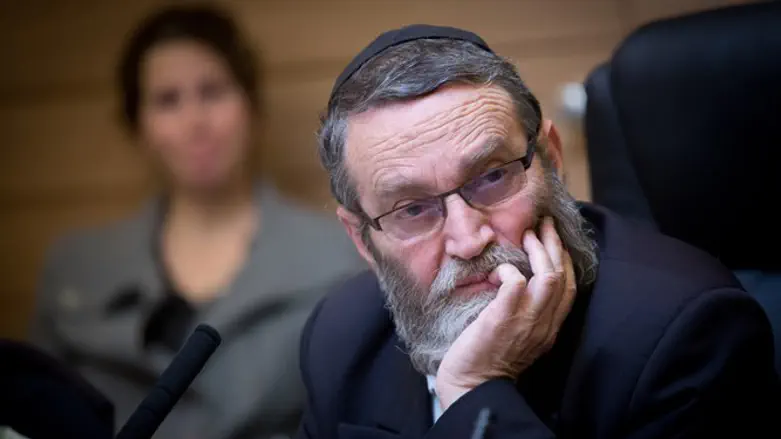
Knesset Finance Committee Chairman MK Moshe Gafni (United Torah Judaism) today (Wednesday) opened a discussion on intervention of the Attorney General and police into special celebratory occasions.
The hearing was set at the initiative of MK Gafni, in part because of an attempt to cancel an Hakafot shniyot celebration in Jerusalem following the last Simchat Torah holiday after the establishment of a barrier designed to separate women and men who were supposed to participate in the event. In the end, the hearing was postponed for a month at the request of the Attorney General.
"Someone invented the concept of 'exclusion of women', which sounds very good for marketing, and the subject gained momentum until the previous Attorney General issued a directive and his deputy, Dina Silber, gave guidelines and rules that sought to prevent separation between women and men in public events," Gafni said at the start of the discussion.
He said that it was a blatant intervention in the holding of events unique to the haredi and religious sectors.Gafni noted that after turning to the current Attorney General, his deputy attorney Zilber, and the Justice Minister, the Minister told him that the directive did not apply to everyone.
However, he said, "a parliamentary debate is needed to make sure that we do not leave the issue open so that in a few years, after the position holders are replaced, people will unknowingly violate the Attorney General's guidelines and rules."
After presenting the matter to Knesset members, Gafni added that he had received a request from the Attorney General to postpone the hearing by a month, so that the advisor and his team could then formulate rules and submit an orderly document to the Finance Committee.
In order to illustrate the problematic nature of the guidelines from above, Gafni said: "If my wife and children live according to this way of life, which stems from faith, observance of halakha, modesty, and our worldview creates separation between men and women in different situations, not to exclude women, but that it is our way of life and that's how we want it, both women and men, does that make them criminals?
"From the Justice Minister's reply to me, it is clear that this is not an offense, but it is not according to the Attorney General's rules," Gafni explained. "This has to be clarified and regulated in order to prevent unpleasant situations in the future."
MK Mickey Rosenthal ("Zionist Camp") asked that in the coming months, the Attorney General "lay down some paper that will serve as the basis for a discussion we will hold then. There are a lot of issues here that are relevant to the discussion, and we have to know first of all what the Attorney General's guidelines are and what rules he wants to determine."
Gafni replied to Rosenthal that he really wanted to demand that the rules be placed on the committee's table before the hearing. "There was a meeting with the Justice Minister and the deputy, attorney Dina Zilber, and I was told that the rules do not relate to this subject of unique cultural events, but I wanted it written somewhere, for in a few years a Justice Minister or other legal counsel will come to say that it is forbidden, and if you make a wedding for your daughter and there is a partition, you break the rules.
"It should be clear that if a group whose way of life it is wants to make an event, such as a Student Day for haredi or religious students, then they should be allowed to hold a separated event. In any case, in view of the Attorney General's request to allow them time to set clear rules on what is forbidden and what is permitted, I agree to the request and the hearing will take place in another month."
Deputy Attorney General Dina Zilber told Knesset members that "the request of the minister and the legal advisor is acceptable to me. The legal framework is familiar, and there is a report and a government decision that establishes the obligation of the Israeli government to fight against exclusion of women, the examples that my colleague Gafni gave are from the private domain. With regard to public space, we need to formulate clear rules and this we will do."
Gafni turned to Zilber and said, "Your decisions lack what is being done with those groups that say they want separation ... I request a detailed paper on the subject that will be presented to the committee in a month."
Members of Knesset from various factions who attended: Rachel Azaria (Kulanu), Tamar Zandberg (Meretz), Micky Rosenthal ("Zionist Camp"), Mickey Levy (Yesh Atid), Michal Rozin (Meretz), Yael Cohen-Paran German (Yesh Atid).